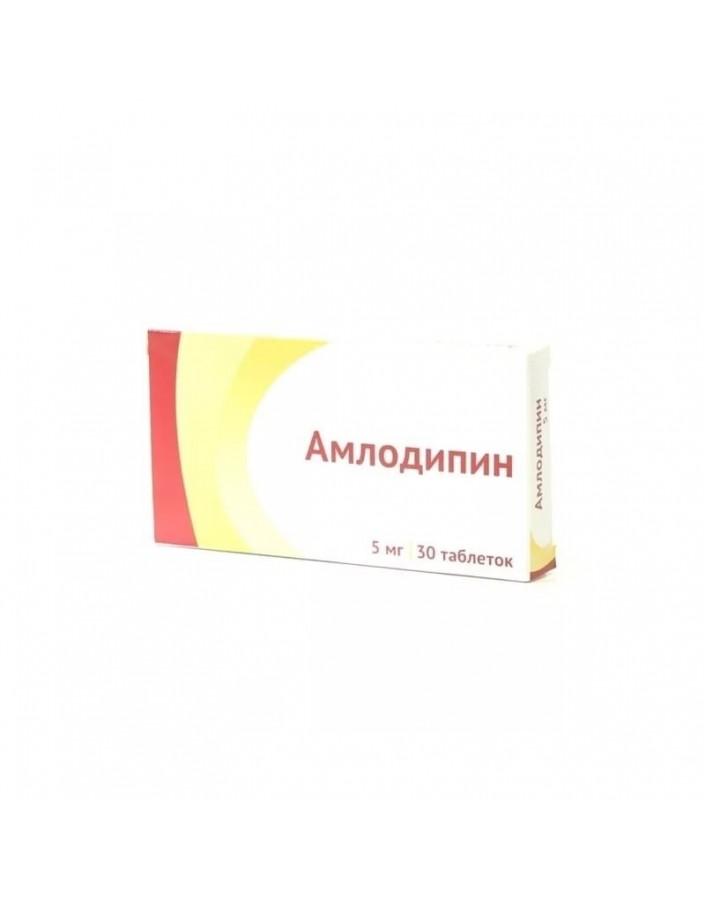




Security policy (edit with Customer reassurance module)

Delivery policy (edit with Customer reassurance module)

Return policy (edit with Customer reassurance module)
Selective Calcium channel blocker class II. Antihypertensive effect due to a direct relaxing effect on vascular smooth muscle. It is assumed that the antianginal effect of Amlodipine is associated with its ability to expand peripheral arterioles; this leads to a decrease in OPSS, reflex tachycardia does not occur. As a result, there is a decrease in myocardial oxygen demand and energy consumption by the heart muscle. On the other hand, amlodipine, apparently, causes the expansion of large-caliber coronary arteries and coronary arterioles in both intact and ischemic myocardial regions. This provides oxygen to the myocardium during spasms of the coronary arteries.
When ingestion is absorbed from the gastrointestinal tract slowly and almost completely, the maximum concentration in the blood plasma is reached within 6-9 hours. Protein binding is 95-98%. It undergoes minimal metabolism during the first passage through the liver and a slow but significant hepatic metabolism with the formation of metabolites with negligible pharmacological activity.
The average elimination half-life is 35 hours and, in case of arterial hypertension, can increase on average up to 48 hours, in elderly patients - up to 65 hours, and in disorders of liver function - up to 60 hoursIt is derived mainly in the form of metabolites: 59-62% - by the kidneys, 20-25% - through the intestines.
Arterial hypertension (including as part of combination therapy), stable angina, unstable angina (including angina Printsmetal).
For adults, by ingestion, the initial dose is 5 mg 1 time / day. If necessary, the dose may be increased.
Maximum dose: when ingestion - 10 mg / day.
Cardiovascular: peripheral edema, palpitations, hyperemia of the skin are possible; when used in high doses - arterial hypotension, arrhythmias, shortness of breath.
Gastrointestinal: nausea, abdominal pain; rarely - gingival hyperplasia.
From the side of the central nervous system: possible headache, fatigue, drowsiness, dizziness.
Allergic reactions: skin rash, itching.
Severe arterial hypotension. Hypersensitivity to dihydropyridine derivatives.
The safety of using amlodipine during pregnancy and lactation has not been established. Application is possible only in cases where the intended benefit to the mother outweighs the potential risk to the fetus or child.
With caution used for violations of the liver, with stenosis of the mouth of the aorta, with chronic heart failure.Patients with impaired renal function, as well as elderly patients do not need to reduce the dose. Perhaps the use of amlodipine for the treatment of patients with dilated (non-ischemic) cardiomyopathy, accompanied by severe form of chronic heart failure.
Clinical data on the use of amlodipine in children are not available.
Amlodipine in the form of pills is included in the List of Vital and Essential Drugs.
With simultaneous use of amlodipine with other antihypertensive drugs may increase the hypotensive effect; with means for inhalation anesthesia - possibly increased hypotensive action; with lithium preparations - manifestations of neurotoxicity are possible, incl. nausea, vomiting, diarrhea, ataxia, tremors and / or tinnitus; with sympathomimetics, hypotensive action may be reduced. Indomethacin and other NSAIDs can reduce the hypotensive effect of amlodipine, inhibiting the synthesis of prostaglandins in the kidneys and / or causing fluid retention.